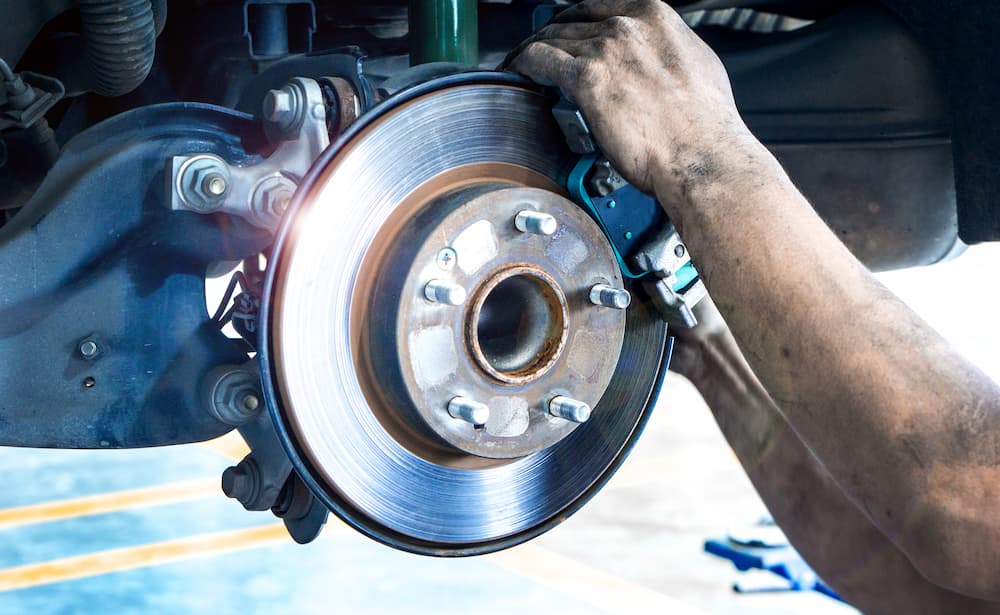Your brakes are essential in providing you with a safe driving experience. So, what does it mean when they start to screech and squeak? Let's take a look at some reasons they might be complaining and what you can do to make them stop. Some squeaky brake issues may be DIY-friendly, while other problems are best left to the pros. Our experts are Hallmark Hyundai North are here to help you figure out why your brakes are squeaky and what we can do to help.

Reasons Why You Have Squeaky Brakes
Squeaky brakes are at the top of the list of toe-curling sounds, and your ears will thank you for fixing them quickly. Those high-pitched squeaks can indicate several different issues, including:
- Worn-Out Brake Pads: Most often, squeaky brakes mean it's time to have them replaced. In fact, they're designed to make that atrocious sound to indicate that your brakes are worn out. Because you can't see your brakes, it's best to have a professional take a look.
- The Weather: Sometimes, brakes make noise when condensation forms on the rotors. This happens when rain, snow, or exceptionally humid conditions are present, and the squeaking should stop when the rotors have warmed up. If this is the case, there's nothing wrong.
- Dust and Debris: If debris gets between the pads and rotors, it can lead to lots of screeching. Cleaning and lubricating the brakes can eliminate the problem, but it's hard to tell by sound whether the brakes are worn out or just dirty. Because of this, it's best to let a professional look at them to determine the cause.
- Poor Installation: Sometimes, brakes aren't installed properly. This can lead to parts rubbing together that shouldn't and brakes that squeak in protest. A professional can determine whether your brakes are installed correctly and whether they need to be replaced.
Types of Brakes on Cars
Disc brakes and drum brakes are the two types of brakes that you'll find on most vehicles. Some passenger vehicles also have anti-lock brakes and emergency brakes for added safety.
- Disc Brakes: Disc brakes are what you'll find on most passenger vehicles. They're usually located on both axles. A disc (also known as a rotor) is pressed against brake pads when a driver presses the brake pedal to stop.
- Drum Brakes: Drum brakes can be found on the back wheels of some vehicles. They're composed of a hollow drum and a curved shoe. When the brake pedal is pressed, the shoe presses against the drum to make the vehicle stop.
- Anti-Lock Braking System (ABS): An ABS is an automated system that keeps your brakes from locking up. This is especially helpful in wet and icy conditions. Together with the vehicle's disc or drum breaks, the ABS system can help a driver to stop sooner and prevent collisions.
- Emergency Brakes: An emergency brake is typically used to keep your car from moving while it is parked. In an emergency, like when the brakes fail, a driver can use their emergency brake to stop or slow down.
When to Send Your Car to the Pros
Since brakes are tucked away, and out of sight, it's hard to diagnose a squeaky problem on your own. Our crews at Hallmark Hyundai North Service have the equipment and expertise to look at your brakes and determine the cause of their complaints. Some car repairs may be easy to DIY, but we never recommend messing with your brakes. Properly installed brakes are essential for your safety, and it's just not a risk that's worth taking.
Hallmark Hyundai North, for All Your Auto Needs in Jackson, Mississippi
Squeaky brakes are a common issue that can be a cry for help. If your brakes are making noise, they may be worn out, poorly installed, or just dirty. If your brakes are squeaking, our pros at Hallmark Hyundai North Service are happy to help. Contact us to schedule an appointment. We'll figure out why they're squeaking, and we'll make sure they're quiet when you leave.
Image Source: pdsci/Shutterstock
Categories:
Blog

